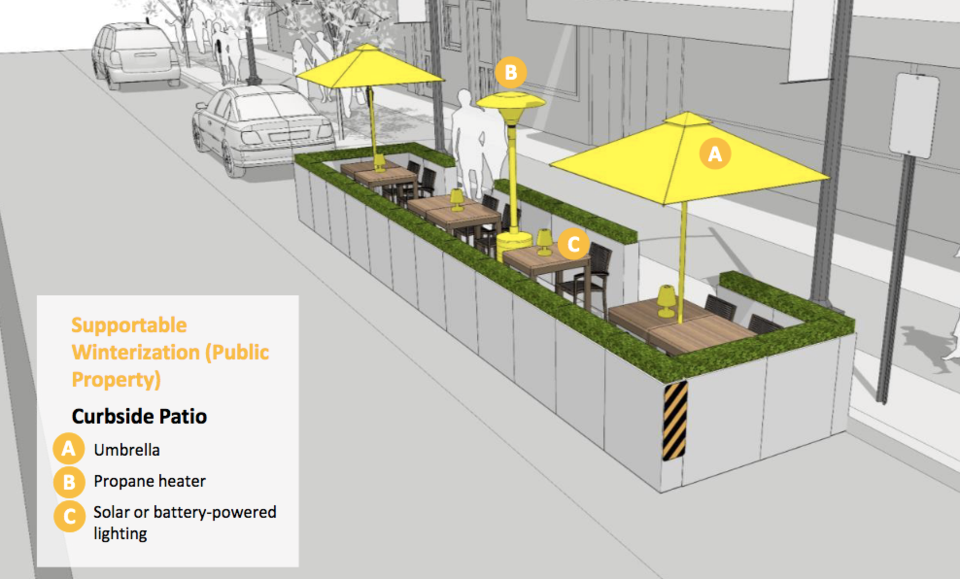The cost is related to $800,000 in lost revenue from fees and permits waived for operators of the city’s 415 temporary patios and $1.3 million in staff time, materials and equipment.
“The winter program looks quite a bit different from the summer program,” said Jessie Adcock, the city’s general manager of development, buildings and licensing in a presentation to council. “There’s a significant increase in the amount of risk that we have, as well as operational considerations.”
Adcock was referring to allowing propane heaters, table umbrellas, awnings, fire-proof curtains and lighting on patios during dark, inclement weather, with customer safety a concern.
An accompanying to Adcock’s presentation identified concerns with patio coverings such as small tents or umbrellas blowing into traffic.
The majority of the patios — 269 — are located at curbsides on busy streets such as Main Street, with 67 on sidewalks. Those two figures account for all 336 public patios, with another 79 set up in private spaces.
The patios are largely concentrated downtown, along Commercial Drive, in Mount Pleasant and through Kitsilano, with only a handful located in the southern part of the city.
麻豆传媒映画Coastal Health is being consulted about ventilation and how to prevent the spread of COVID-19 at a covered patio, said Adcock, noting guidelines will soon be posted on the city’s website.
Operationally, staff has concerns about patios impeding rain water from reaching catch basins and making leaf and snow removal difficult for city crews. The ability for buses to reach riders, the fire department to connect to water supply and transport trucks to access businesses are other concerns.
Those concerns could mean business owners have to adjust their patio designs or remove the patios, with staff launching a compliance process to monitor safety risks — a process the city didn’t have in the summer months.
The patio program launched in June as an effort by council to assist businesses hit financially hard by the pandemic. Many restaurants, cafes and other food services had to close temporarily to adhere to physical distancing measures, while some resorted to take-out and delivery.
Adding patios has allowed businesses to attract and serve customers outdoors to reduce the spread of COVID-19. But what the customer base will be through the fall and winter is an unknown and a reason why Coun. Sarah Kirby-Yung wanted the program extended until Oct. 31, 2021.
Staff had recommended council extend the program to March 31, 2021, noting it would see less revenue loss in permit fees for a total cost of $1.3 million, instead of $2.1 million to extend to October.
“There’s a lot of uncertainty here, and we want to keep these businesses in our neighbourhoods,” said Kirby-Yung, noting she recognized the cost but pointed to money coming from the federal government to assist with the city’s budget.
Coun. Lisa Dominato echoed Kirby-Yung in the need to extend the patio program until October, saying it was clear “we have to do everything possible within our jurisdiction and authority” to support small businesses.
“They’re critical to our local economy, and I think many operators are quite anxious about going into this winter, particularly if there’s a second wave and the public is hesitant to go out and to eat in,” Dominato said.
Coun. Jean Swanson supported the extension of the patio program but said she wanted the city to ensure more outdoor covered spaces were in place in the Downtown Eastside for people this winter.
“If we had some of those big tents with no sides, so we could get airflow for COVID and put some chairs in there and some heat, it could really help people,” Swanson said.
“People are noticing the city is working really fast for the restaurants — for people who can afford to eat in restaurants, and for the businesses — but when it comes to people in the Downtown Eastside, everything is just kind of limping along.”
Business operators who want to keep their patios open until next fall can apply to the city beginning Oct. 23.
@Howellings



